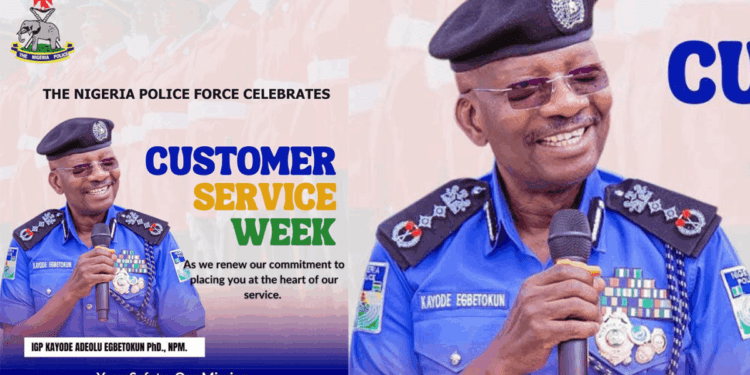The Nigeria Police Force has sparked outrage after referring to Nigerians as its “customers” in a post celebrating Customer Service Week on Thursday.
In a statement social media, the police said; “Yes, you — our esteemed customer, we celebrate you
.”
The message was accompanied by a photo of Inspector General of Police Kayode Egbetokun with the inscription, ‘The Nigeria Police Force celebrates Customer Service Week as we renew our commitment to placing you at the heart of our service.’
The post immediately triggered a wave of criticisms from Nigerians who alleged that the police had trivialised the concept of public service, as many Nigerians battle harassment, extortion, and brutality at the hands of cops.
“I don’t know what kind of joke this is,” Chinonso Okeke, a commercial driver in Lagos, told Peoples Gazette. “I was stopped by policemen at Iyana Ipaja last month, and they forced me to pay ₦20,000 even when my papers were complete. If that’s their idea of customer service, then Nigeria is finished.”
Similarly, Zainab Ali, a fashion designer in Abuja, described the post as a “mockery of victims of police corruption”.
“They call us customers because they extort us every day. I was once stopped at night at Wuse 2 for no reason and asked to ‘drop something.’ I had to pay the last ₦4,000 just to be allowed to go. I am not their customer — I am their victim,” she told The Gazette.
Tunde Adebajo, a journalist based in Ibadan, noted that the message shows how out of touch police authorities are with public sentiment.
“Instead of apologising for the daily extortion that Nigerians face at checkpoints, the Force is celebrating Customer Service Week,” said Mr Adebajo. “Nigerians are forced to pay bribes just to avoid being arrested for crimes they didn’t commit. That’s not customer service — it’s state-sanctioned extortion.”
Blessing Ude, a university student, explained to The Gazette that she found the message “deeply offensive”.
“The police are supposed to serve and protect. Calling us customers means they see us as people who owe them money,” stated Ms Ude. “The last time I was stopped, one officer told me, ‘Madam, settle us now; we’re working for you’. That’s what they mean by ‘customer’. It’s shameful.”
However, not everyone shared this outrage.
“The word ‘customer’ is not entirely wrong. The police provide security services, and in a way, citizens are the recipients of that service,” Daniel Obot, a retired civil servant, told The Gazette. “Maybe it’s just poor phrasing, but I think their intention was to show appreciation, not to mock anyone.”
Amaka Odu, a business owner in Lagos, argued that the police might have been trying to project a more friendly image.
“I think they were simply trying to rebrand their image and sound approachable,” Ms Odu explained. “They didn’t mean ‘customer’ in a commercial sense. Maybe people should look at the intention rather than the wording.”
Yet, many Nigerians insisted the term was tone-deaf and insulting, especially amid widespread reports of extortion, unlawful detention, and brutality across the country.
Civil rights activists also weighed in on social media, urging the police to “understand the difference between citizens and customers”.






